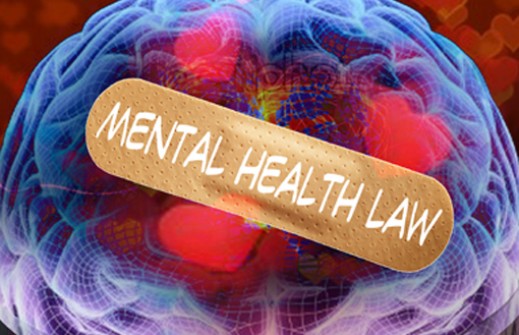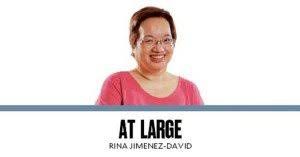COLUMN-OPINION: AT LARGE by Rina Jimenez-David – Duterte’s mental health
Now that he has signed the Mental Health Law, President Duterte would do well to take advantage of the comprehensive coverage guaranteed in the law and seek psychological counseling for himself.
To explain his tirade denouncing the God of the Christians (and also of Muslims and Jews), Duterte’s defenders referred to two factors which could explain his antipathy to the Catholic Church, its leaders and, ultimately, to the deity worshipped by believers.
One factor is the alleged abuse and molestation he says he suffered at the hands of a Catholic priest when he was a young man. It is difficult to ascertain the story, since the accused has been long dead and no one, as far as the public knows, has come forward to corroborate the President’s claim.
ADVERTISEMENT
The second factor, say those interpreting Duterte’s words, is his mother, a religious woman, who disciplined him harshly as she sought to curb her son’s stubbornness and wayward nature.
There doesn’t seem to be a direct, logical line connecting the alleged abuse he suffered or his mother’s draconian ways to his present-day views on religion. But given that he brings up these incidents repeatedly, especially in the context of his faith or lack of it, it seems clear that these had been deeply traumatic and left seeds of psychic pain that bubble up to the surface of his consciousness whenever provoked.
I wonder whether PDuts has ever sought counseling or talk therapy to address his “demons.” Clearly, these have shaped or warped, if you will, his view not just of religion or spirituality, but of humanity and acceptable behavior. His response to most challenges has been anger and vindictiveness. His behavior toward his enemies, but especially women who deviate from his stereotyped view of their proper behavior, has been harsh and rude, to say the least. When legal and political maneuvers prove inconvenient, he resorts to attacking their reputations, their character and their sexuality.
Clearly, in the President’s case, the personal is political.
But who will be so bold to tell the President to his face that he needs help? Who will risk his or her position, as well as court the President’s ire, to tell him he needs to seek relief from the traumas bedeviling him?
Unfortunately, timidity and even denial are common responses to mental health issues. The person suffering from mental illness would be loathe to admit his or her condition, much less seek relief or even a cure. But the people in a position to help — immediate family, loved ones, friends, workmates — would be hard-pressed to recognize the condition, much less stage an intervention. Sadly, mental health is little understood and clouded by myths and misconceptions.
Sen. Risa Hontiveros, principal author in the Senate of Republic Act 11036 or the Philippine Mental Health Law, says this piece of legislation focuses not just on diagnosis and treatment but, more important, also on educating the public. The law mandates the Department of Health, as well as Department of Education, to extend the “full range of psychiatric, neurologic and psychosocial services” at the tertiary level, regional and provincial hospitals. It also calls for the institution of anti-stigma and anti-discrimination programs in schools and workplaces.
Studies show that one in five Filipinos suffers from depression, while the toll of suicide has reached a shocking seven each day.
ADVERTISEMENT
What most authorities want to convey is that mental health issues are curable or at least manageable. While drugs like anti-depressants help keep the worst symptoms under control, patients could also benefit from behavioral therapy and counseling by professionals.
A big problem in dealing with mental health is the shame attached to it, with many sufferers and their families viewing it as somehow a consequence of a personal “weakness” or else of a “tendency” that runs in families. Thus, the need for secrecy, with some relatives resorting to the drastic measure of keeping the afflicted confined at home, or, in some worse cases, chained to a post.
What would happen, I wonder, if someone made public that he was seeking help to address his own state of mind?
 All photographs, news, editorials, opinions, information, data, others have been taken from the Internet ..aseanews.net | [email protected] |.For comments, Email to :D’Equalizer | [email protected] | Contributor
All photographs, news, editorials, opinions, information, data, others have been taken from the Internet ..aseanews.net | [email protected] |.For comments, Email to :D’Equalizer | [email protected] | Contributor









